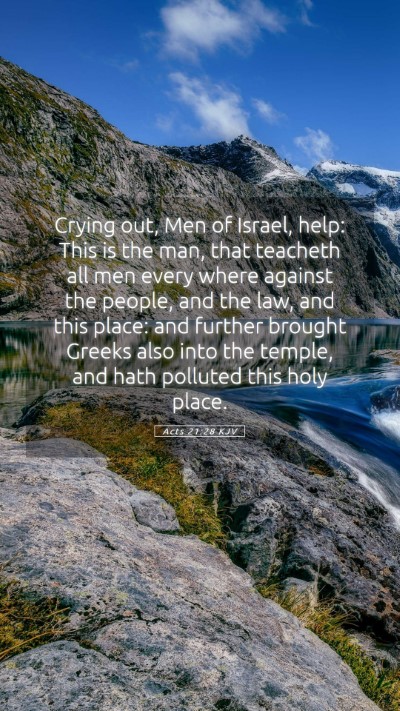Understanding Acts 21:28 - A Comprehensive Bible Verse Explanation
Acts 21:28 states:
"Crying out, Men of Israel, help! This is the man who teaches all men everywhere against the people, the law, and this place; and furthermore, he also brought Greeks into the temple and has defiled this holy place."
Overview of Acts 21:28
In this verse, we witness a significant moment of tension within the early Christian community and Jewish society. The arrested individual is Paul, whose ministry has drawn considerable ire from certain Jewish groups. The verse encapsulates the accusations leveled against him, reflecting deeper conflicts within the early Church.
Analysis and Commentary
To provide a thorough understanding of this verse, we draw insights from renowned public domain commentaries:
Matthew Henry Commentary
Matthew Henry highlights that the Jewish people were alarmed by Paul's actions, interpreting them as a violation of their sacred laws. His ministry was perceived as a threat to the established traditions and beliefs of the Jewish faith. Henry emphasizes the importance of recognizing the animosity that existed between early Christians and Jews, stemming from misunderstandings and misrepresentations of the gospel.
Albert Barnes Commentary
Albert Barnes elaborates on the historical context of the accusations. He explains that Paul was falsely accused of bringing Gentiles into the temple, a serious charge that incited anger among the Jews. Barnes points out that such actions were seen as an affront to the sanctity of the temple, a central piece of Jewish worship. He stresses that these accusations were fueled by a combination of religious zeal and misunderstanding of Paul’s true intentions.
Adam Clarke Commentary
Adam Clarke provides insight into the implications of these accusations. He underscores that bringing Gentiles into the temple was considered blasphemy, indicating a profound cultural and religious divide. Clarke mentions that the response of the crowd indicates their deep-seated beliefs and the lengths they would go to protect their faith. He further examines the theme of persecution faced by early Christians, indicating that such hostility was a precursor to the suffering that many faithful faced for their beliefs.
Key Themes in Acts 21:28
- Religious Conflict: The verse exemplifies the ongoing conflict between early Christianity and Judaism.
- Misunderstanding of the Gospel: Paul’s message was often misconstrued, leading to false accusations.
- Cultural Division: The implications of bringing Gentiles into Jewish sacred spaces highlighted the broader cultural tensions.
- Persecution of Believers: This event foreshadows the persecution that the early Church would endure.
Application and Relevance
Understanding Acts 21:28 requires not only a grasp of its historical context but also an application to contemporary faith contexts. The accusations against Paul can reflect how misunderstanding can lead to conflict in modern religious communities. Further, this verse invites believers to reflect on how they communicate their faith and the importance of bridging gaps between different cultural and religious backgrounds.
Related Bible Cross References
- Acts 21:30 - The immediate consequences following the accusations.
- John 10:31-33 - Reflecting on the Jewish leaders’ harsh response to perceived blasphemy.
- Galatians 2:7-8 - Paul’s reminder of the mission to both Jews and Gentiles.
Conclusion
Acts 21:28 serves as a microcosm of the struggles faced by the early Church in the context of cultural and religious boundaries. By exploring this verse through the lens of esteemed commentaries, we gain deeper insights into the nature of faith, the often-tumultuous relationship between different religious sects, and the significance of understanding Scripture in our daily lives.
Further Study and Reflection
For those interested in exploring bible verse meanings deeper, engaging in Bible study groups or utilizing bible study tools can be beneficial. Resources such as bible study guides and bible study lessons further enhance our grasp of difficult passages and illuminate the significance of early Christian teachings.


